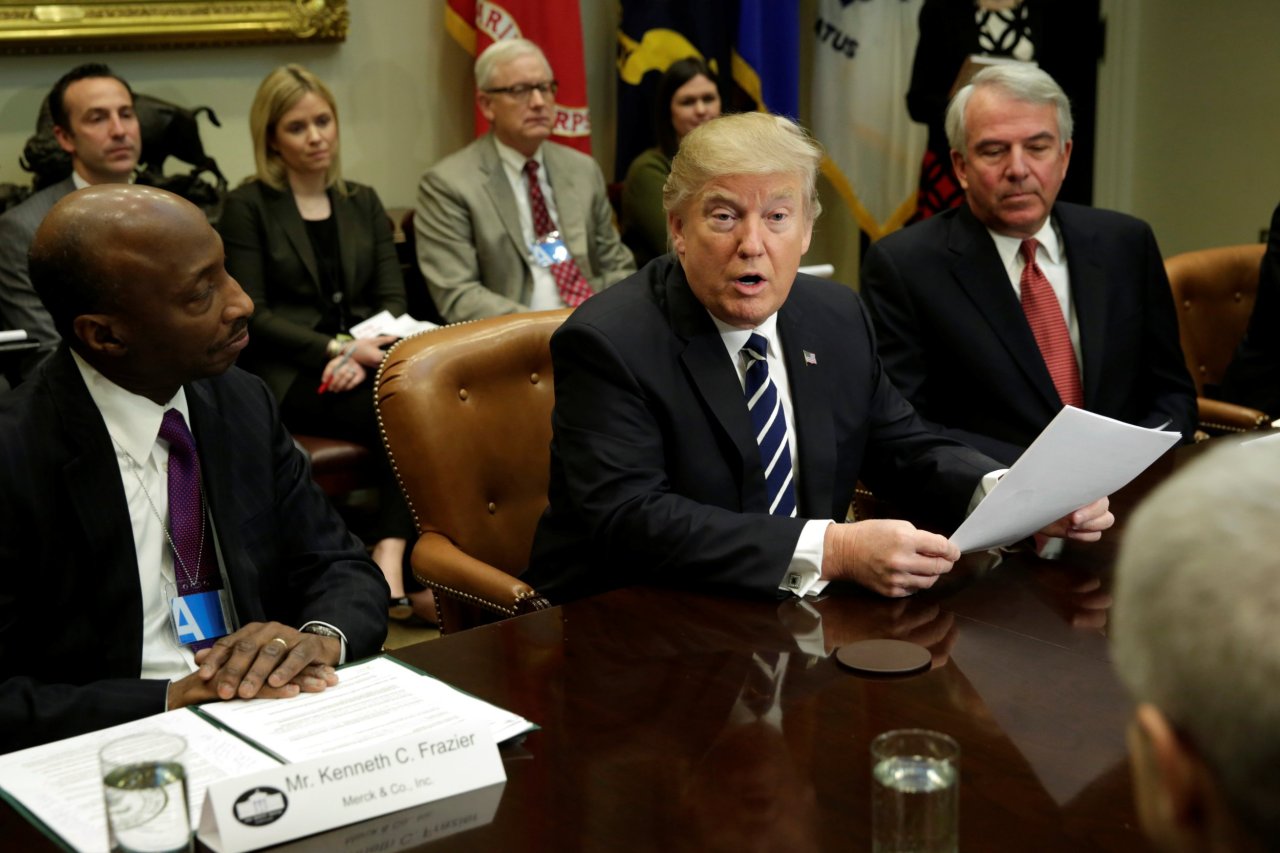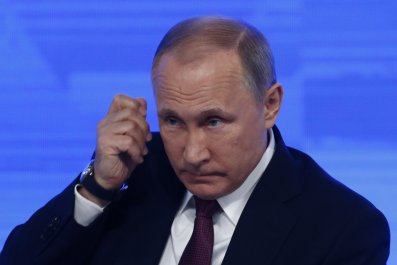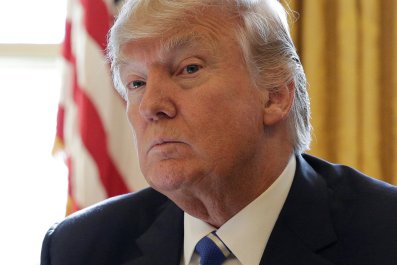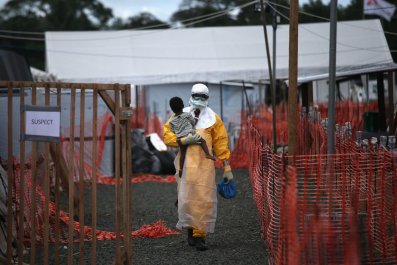On the last day in January, President Donald Trump met with chief executives from some of the wealthiest pharmaceutical companies in the United States to discuss the future of their industry. The Oval Office meeting, which was closed to the press after opening remarks, included an issue vital to most people not inside the room: the high price of pharmaceuticals.
"We have to get prices down," the president said in his public introduction. "We have no choice." He suggested several means toward that end, but veterans of the decades-long battle to lower drug prices say the proposed ideas are unlikely to accomplish anything—at least not without also harming patients.
Related: Should drug prices be capped?
Trump wooed the attending CEOs—representing six drugmakers plus the Pharmaceutical Research and Manufacturers of America, the industry's chief lobbying organization—with promises of speeding up the process of bringing new drugs to market and removing regulations that deter companies from manufacturing drugs stateside. "You can't get approval for a new plant, you can't get approval for a new drug," he said. "So we're going to take care of that."
The president also said he would "increase competition through bidding wars" to lower prices, though he did not elaborate on this tactic during his remarks. He also questioned policies that enable other countries to, in his words, pay too little for prescription medications. "We are going to be ending global freeload."
But the likelihood that any of the approaches discussed in that meeting—at least those to which the press were privy—could bring prices down seems low, according to several longtime experts.
Take drug development. Trump said he will be "streamlining the process" so that companies do not have to wait years for a new product to be approved. Although he did not provide details, he hinted that his yet-to-be-named chief of the Food and Drug Administration has some plans. One leaked candidate for the post, Jim O'Neill, managing director of investment company Mithril Capital, publicly supports eliminating a large part of the drug approval process; namely, Phase II and III clinical trials, which test the effectiveness of new medications. The rationale is that easing FDA requirements would shave several years and millions of dollars off a company's investment in experimental products.
But such an approach is unlikely to reduce prices, says James Love, director of Knowledge Ecology International, a nonprofit research organization focused on vulnerable populations. "Right now, the U.S. lets companies charge whatever they want here," says Love. In other words, the market price does not depend on the up-front investment. And the government lacks the means to force drug companies to lower prices in parallel with reduced development costs, says Winston Wong, who has worked in health care for more than 30 years and is a consultant to private insurers.
"That's one major win the pharmaceutical companies are looking for...a less rigorous approval process." says Wong. He also points out that testing new drugs for safety only and not benefit—as Phase II and III trials are designed to do—could accomplish the opposite goal. "We could potentially be spending more for therapies that are totally useless."
The notion that lowering manufacturing costs would reduce drug costs is also misguided, says Mike Kelly, CEO of the Americas at Kantar Health, a pharmaceutical industry consulting company. "The cost of manufacturing a drug is infinitesimal compared to what it gets priced at."
The dramatic price difference between branded and generic drugs underscores that point, says Love. The manufacturing process is the same, but branded drugs are, on average, 32 times more expensive than generics. "There's just no relationship between the price of a drug and what it costs to make," says Love.
Kathleen Sebelius, who served as secretary of health and human services from 2009 to 2014 and worked closely with President Barack Obama on crafting the Affordable Care Act, says that without any ability to negotiate or limit prices, the federal government is unlikely to succeed in lowering them. Medicare, the federally funded insurance provider for people 65 and older—and the single biggest drug purchaser in the country—is prohibited by law from negotiating prices. And unlike many other countries, the U.S. has no entity with the power to control prices.
Sebelius also points to the lack of oversight on other aspects of pharmaceutical pricing. Improving the laws that surround patents and the loopholes that allow companies to "evergreen" their drugs (that is, extend the patent life without making substantive changes)—as well as preventing unwarranted spikes in generic drug prices (see Martin Shkreli's Daraprim or Mylan's EpiPen) from entering the market—could all promote competition, she says.
None of these measures have been publicly proposed by the Trump administration. To the contrary, the president has repeatedly vowed to curtail government regulation in general, most recently with an executive order requiring the removal of two regulations for every new one introduced. And although granting Medicare the ability to negotiate drug prices was one of the president's major campaign promises, he has abandoned it. Without the power to limit pricing or more restrictive patent laws, Sebelius says, it is unclear how the federal government could have any impact on drug costs. "I'm baffled. I have no idea what it is that is intended to actually cause drug prices to go down," she says.
Sebelius also points out the ripple effect U.S. drug patents have on trade negotiations. Many countries cannot meet the price tag for branded drugs protected by U.S. patents. Pharmaceutical companies may donate vital medications or offer some amount at a discount, but they won't change the full price. That refusal, says Sebelius, taints broader negotiations, often threatening "to blow up trade deals."
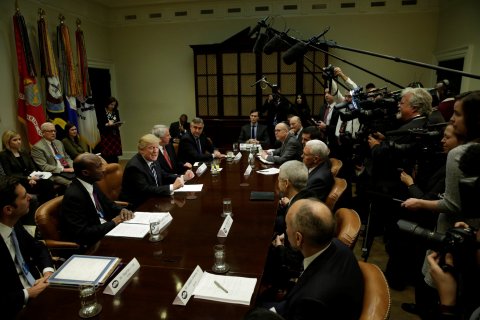
Although the president insisted on Tuesday that he would force foreign countries to pay more for U.S.-manufactured drugs, as another avenue for lowering prices, Love believes this is an impossible demand. Unlike the U.S., many foreign governments do have the power to negotiate prices or refuse to make drugs available on the basis of price. That means they can't be easily pushed into paying more. And anyway, says Love, who was integral in bringing $1-per-day AIDS drugs to India in 2001, increasing foreign prices would have no bearing on what Americans pay. "Pharma charges as much as they can, everywhere they can," he says.
Love notes that many proposed methods of cutting drug costs end up hurting patients in the U.S. and globally, whether through reduced access or diminished scientific scrutiny. "We'd like to focus on areas where the patients aren't getting beat up along the way," he says. His ideas, modeled on how foreign governments control costs, include threatening companies with the loss of their monopoly if prices aren't reduced.
Related: What corporate America really thinks about Donald Trump
Sebelius emphasizes the fact that, despite the cost and review time, most new drugs emerge in the U.S. But she disputes claims by the pharmaceutical industry that restraining its ability to make a profit would slow that innovation. She points out that the amount of money spent on direct-to-consumer advertising of prescription drugs—which federal law made possible in the 1990s, and which is forbidden in most countries—is recouped through sales and leads Americans toward "purchasing the more expensive drug." Without government intervention, she says, market strategies to force down prices will not work. "They may be fine for companies," says Sebelius, "but they don't benefit consumers in the U.S. or anyplace else in the world."
In short, the changes that many people believe would reduce drug prices are the very ones not on the table—at least not publicly.



